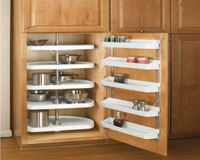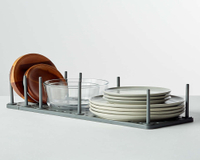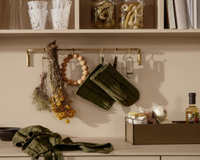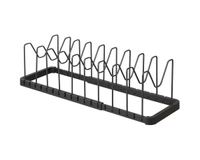Pan storage ideas – 10 neat and tidy ways to store your cookware
Stylish ideas for storing pots and pans that will keep your cookware close to hand
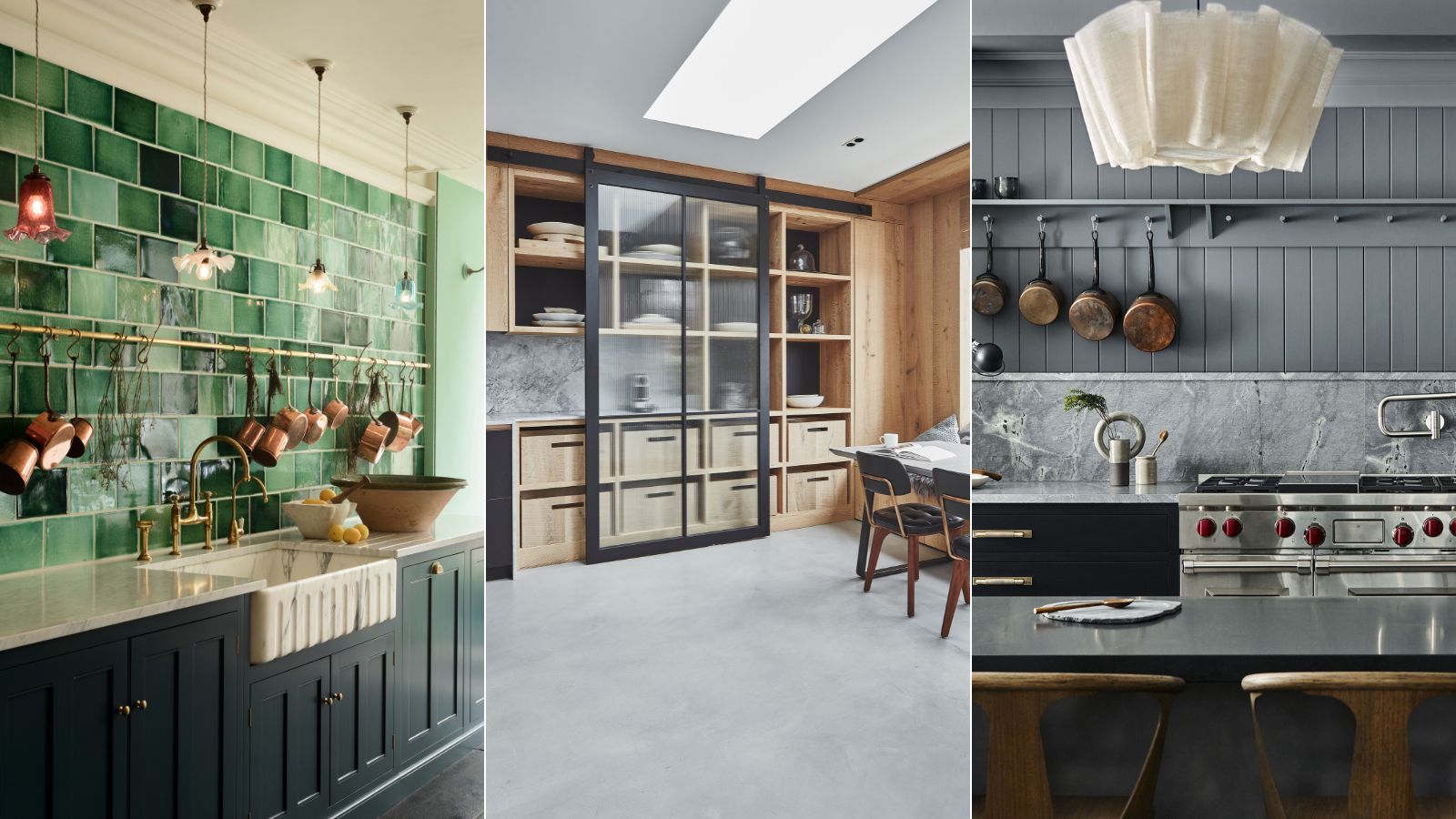
- Pan storage ideas
- 1. Do a pots and pans audit
- 2. Stash outside the main kitchen zone
- 3. Position near your cookware
- 4. Make pans into a 'shelfie'
- 5. Utilize deep drawers
- 6. Keep tabs on pan lids
- 7. Make use of a clever corner unit
- 8. Try a ceiling pot rack
- 9. Maximize wall space with a rail
- 10. Conceal behind a screen
- FAQs
Hardworking pot and pan storage is essential to the smooth running of every kitchen, however big or small. How you stash your collection of bulky, generally awkward-shaped, cookware needs an efficient and organized plan – particularly as they are so frequently used, some on a daily basis.
There’s nothing more frustrating than rummaging around for your favorite casserole pot or grill pan with lids crashing around and handles getting in the way. Your pots and pans need a prime position in the kitchen – a spot close by to the cooking zone if possible – easily accessible to everyone. It’s not all about practicalities though and storing and displaying rows of shiny pots and pans can become a style statement too if you know how.
'Finding adequate and easily accessible kitchen storage for pots and pans in the kitchen is always high on the list for cooks,' explains Susan Serra, a certified kitchen designer. 'The good news is there is a surprising number of places and ways to store this bulky cooking equipment. By focusing on aesthetics and function, the old cast-iron pan can even look like a work of art on the wall!'
Pan storage ideas
Pots and pans are well-used and bulky and storing them might not sound like the most exciting of tasks. However, well-organized cookware can revolutionize day-to-day kitchen life, saving you space and time. Read on for 10 ways to overhaul your pan storage, from smart ways to organize a kitchen to kitchen shelving ideas.
1. Do a pots and pans audit
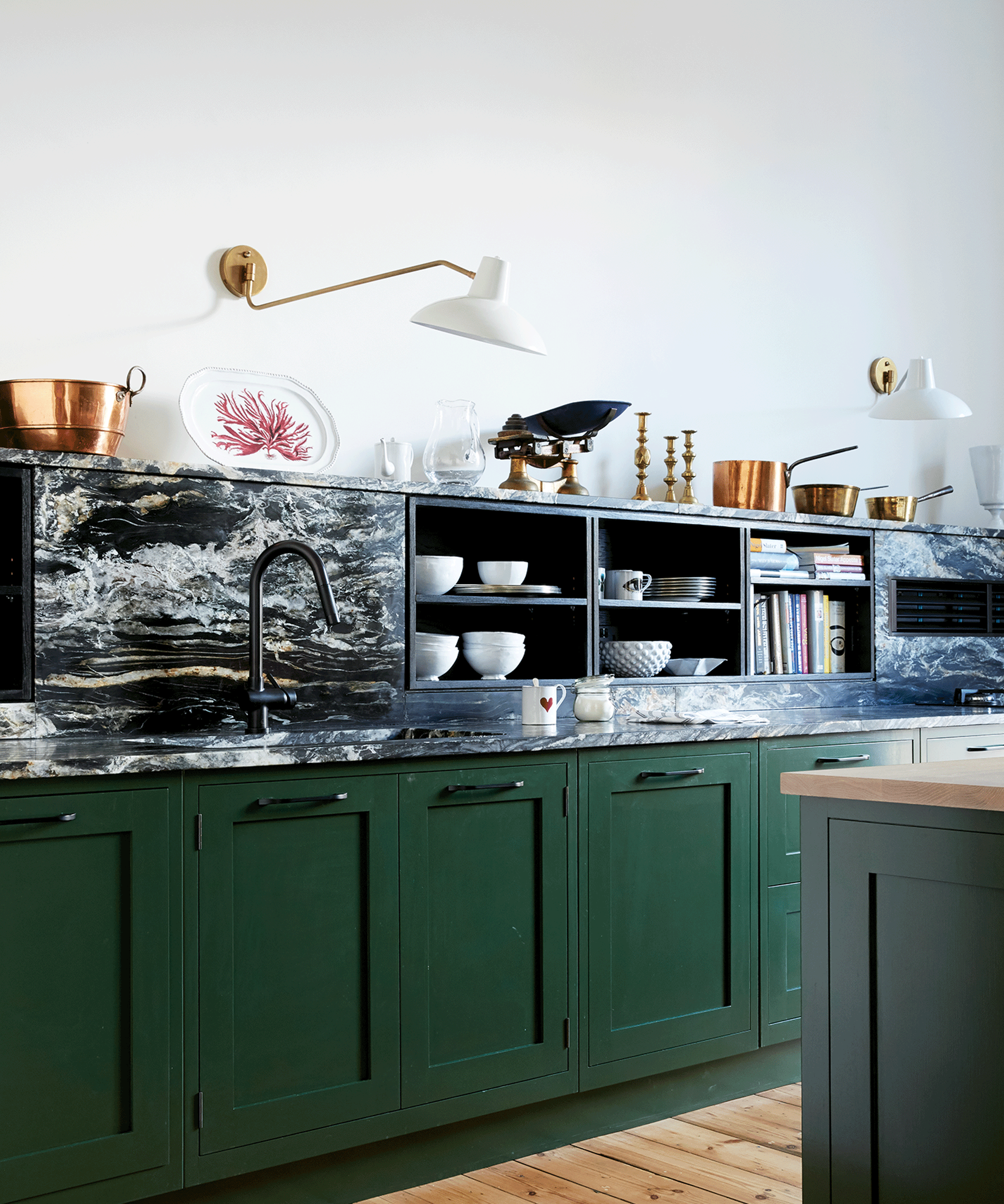
Before starting to organize your pantry or cookware, it’s important to assess what you have. Lay out all your pots and pans and ask yourself a few questions: are they in good condition with matching lids? Do you need them all? Can less frequently-used items be stored outside of the kitchen?
'Firstly, ask yourself if you have too many pots and pans. Are you ever going to use all of these in one go – you wouldn’t have the hob space to do that anyway!' says Melissa Klink, creative director at Harvey Jones.
'My partner used to work as a chef and we have three pots (small, medium, large), two frying pans (small and large) and one skillet – and that’s it. Having the right-sized pot isn’t going to make your food taste better! Be brutal and give away or try and recycle what you don’t need. With your reviewed amount of pots and pans, you should find it easier to store them, one inside another. I also recommend a peg board to slot your lids into.'
2. Stash outside the main kitchen zone
Not every pot, pan and casserole needs to be within reaching distance of your stove and cooktop. Less frequently used items such as a fish poacher, waffle pan and oversized stock pot, can be stored in another area of the kitchen, a sideboard or a pantry. Streamlining your cookware is essential in a small kitchen but it’s also useful to relocate items that aren’t used every day in an average-sized space to create a more efficient storage system.
'Sometimes it can be difficult to find a place for pans that fit in with your interior style,' says Sarah Wilkie, co-founder of Home Barn. 'Opting for larger kitchen cabinets is an easy fix if you are willing to spare the space for pans. You can also invest in a cupboard or set of drawers that can be placed around the edge of the room to ensure the pans are hidden away and don’t disrupt the flow of the room.'
3. Position near your cookware
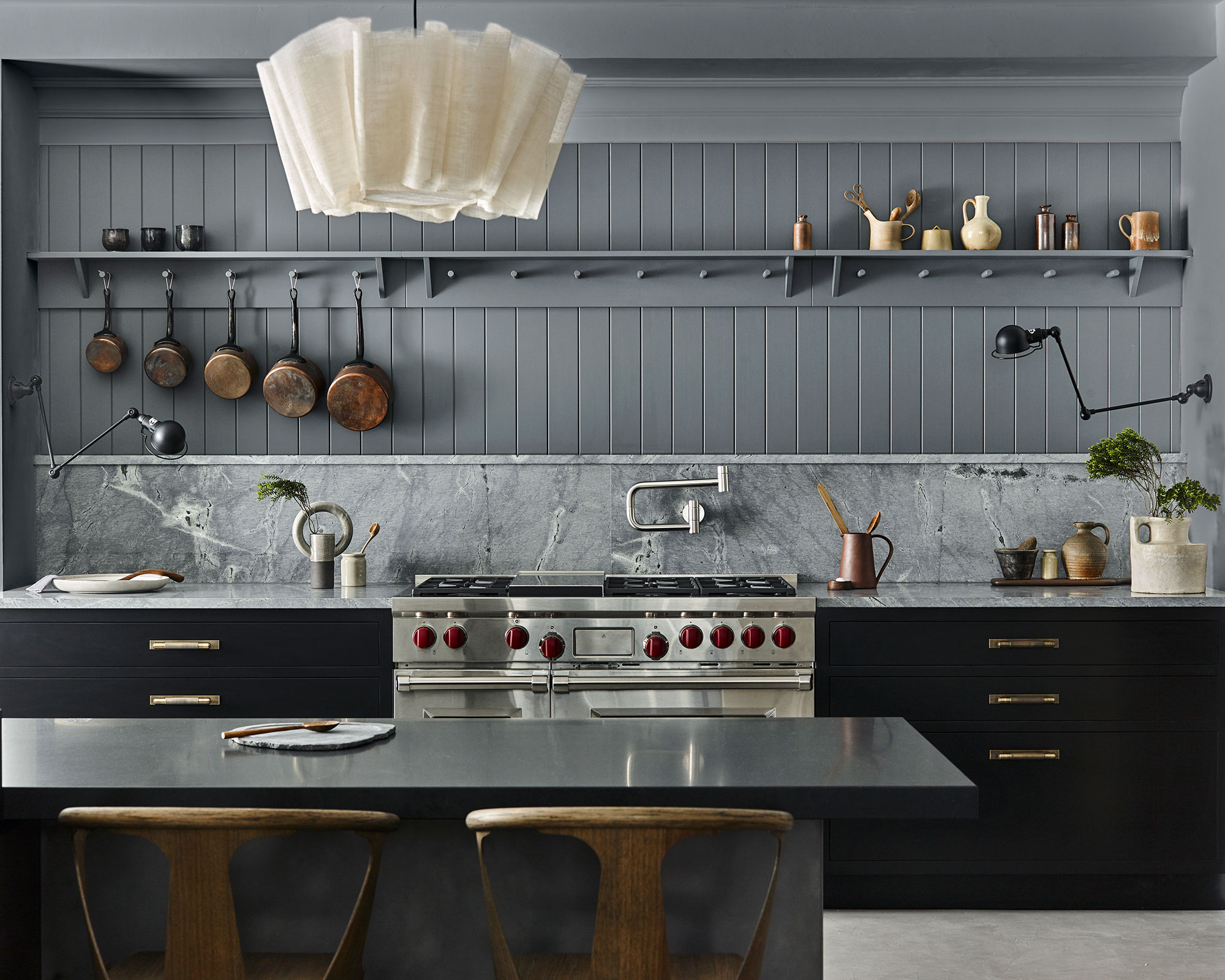
It makes sense to store your frequently used pots and pans as near as possible to the stove and cooktop. A well-organized stack of cookware that’s easily accessible and can be reached and put away within seconds will certainly make for a stress-free cooking experience. Knowing that your favorite pan is to hand will also cut down on unnecessary journeys around the kitchen.
There are so many creative ways to stash pots and pans in and around the cooking zone including deep drawers underneath the hob, a hanging rail above the range cooker, or a neat Shaker-style peg board. Depending on the style and size of your kitchen, you can utilize a combination of storage ideas. Consider rehoming items like glassware and crockery to other zones of the kitchen if they clog up precious storage in the cook space or working triangle.
4. Make pans into a 'shelfie'
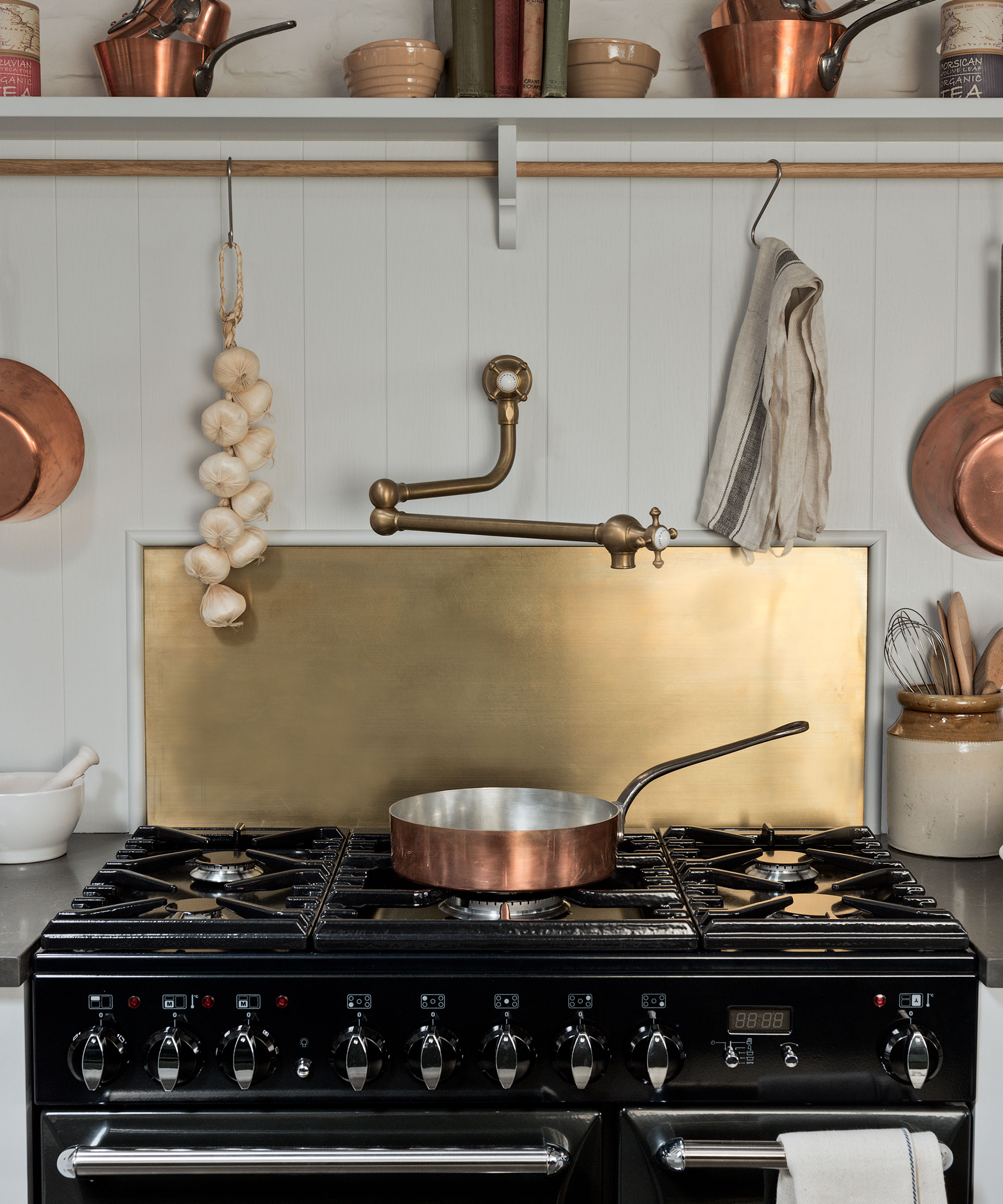
If you prefer a slick, uncluttered look with everything hidden behind closed doors, then displaying pots and pans on open shelving might not be for you. However, if you love the eclectic, country look, there is nothing homier than lining up a row of burnished copper cookware on solid timber shelves. Hang shelving around the stove area to maximize accessibility – this is a great idea in small kitchens where the backsplash can often be unused.
Do bear in mind that pots and pans will need to be spick and span if they are on show for everyone to view. Stick to one type of material says copper or aluminum, if possible, and make sure handles are all facing the same way. Don’t worry about scratches and a well-worn patina as this will add to the character of a country kitchen. Make a design statement out of your cooking kit with say vintage pieces or matching colorful enameled pots that tie in with tiles – the result is personality-packed and style-led.
'Pots and pans can be tricky to store in the kitchen. With so many shapes, sizes and materials, it’s easy to find yourself struggling with cabinets that are overcrowded or too full of clutter,' explains Taja di Leonardi at Mod Cabinetry.
'One of the most efficient ways to store pots and pans is arranging them according to size and shape in drawers or on shelves throughout the kitchen. Open shelving above or below the kitchen countertop is another way to showcase a collection of cooking equipment,' adds Susan Serra. 'Add dimmable lighting to shelving for an ambient shadow effect and mix cooking kit with decorative items and serveware for a design statement that is personal and unique.'
5. Utilize deep drawers
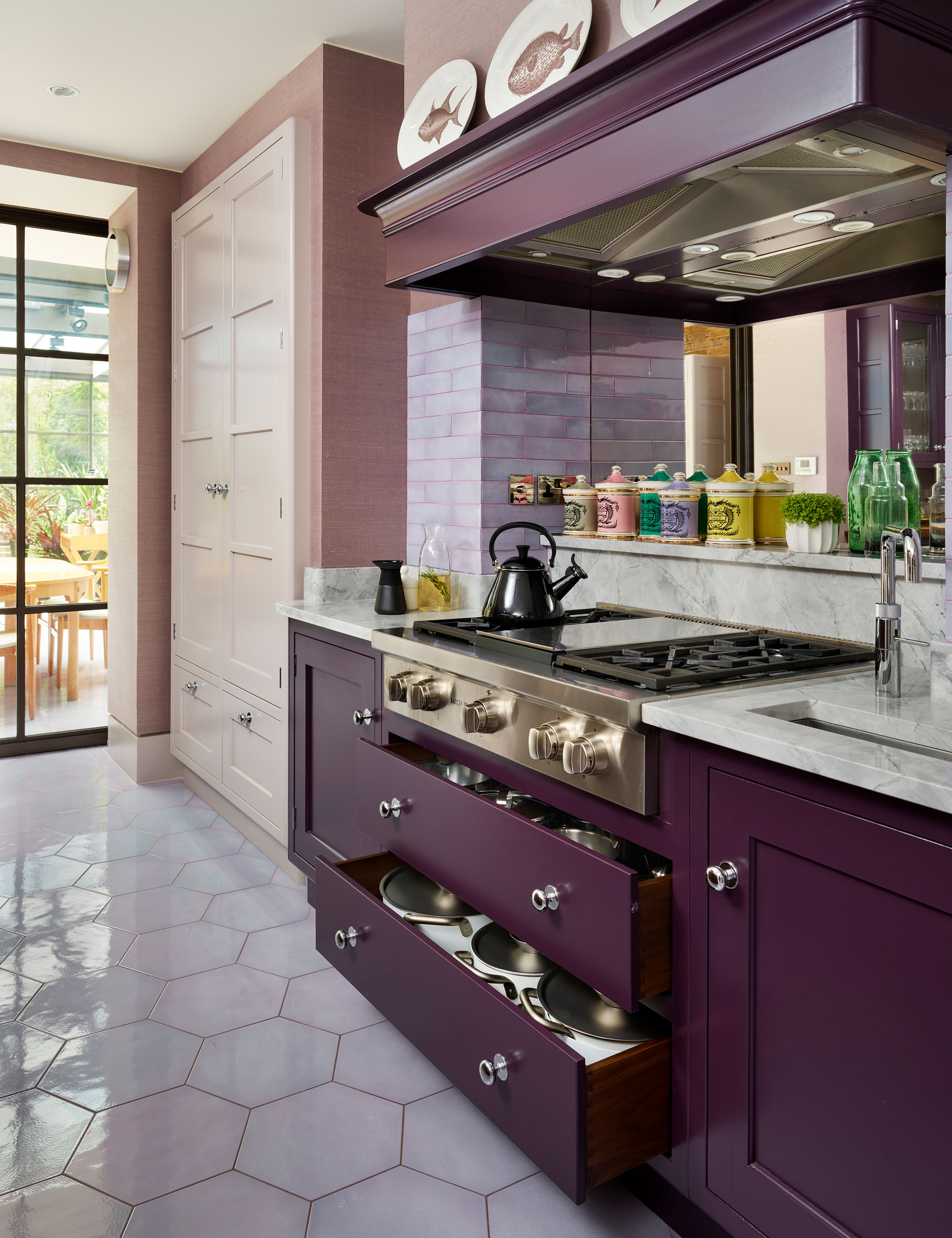
Deep, pull-out pan drawers are one of the most ergonomic ways to store cookware. Look out for spacious drawers on smooth runners that extend fully to accommodate big, heavy pots, extra-large baking trays and bulky casseroles.
'Wide, deep drawers are a great way to store pots and pans as one can pull them out and have a birds' eye view over the whole space rather than crouching and rummaging through a cabinet,' explains Alice Hood, senior designer at Roundhouse.
'Lid racks are great for storing lids upright efficiently,' says kitchen designer Liz Walton of interior design firm Liz Walton Home. 'Positioning these under the stove top or in an island unit opposite the cooking zone will cut back on necessary journeys around the kitchen. A great way to store pots and pans is in drawers. We love deep drawers for ease of access and we typically add an interior divider within the drawer to store pot lids, which can be easy to misplace. We think of it as organization without over-organizing, a system homeowners can live with. We love adding deep drawers under a range top or at the end of an island for convenience.'
Rev-A-Shelf Cabinet Door Organizer | $46 at Wayfair
A kitchen organizer for your cabinets will unlock empty, unused space.
6. Keep tabs on pan lids
Pot and pan lids are one of the trickiest barriers to nailing efficient cookware storage. Not only do they come in different shapes and sizes, but they often have also domed tops, come in varying depths in different materials, and, being curved, can slip around easily.
Stacking neatly comes with its problems but pans are of no use without lids so seek out a storage idea that works for you. If you have the space, simply placing the lid upside down in the pot is simple – this doesn’t offer much opportunity for stacking, but if you do, put a pan protector between each set to stop pans from scraping against each other. Otherwise, fix a rack to the inside of a door, install pegs or inserts into drawers so lids can stand upright, or hang lids alongside your pots and pans from hooks on overhead racks and rails.
7. Make use of a clever corner unit
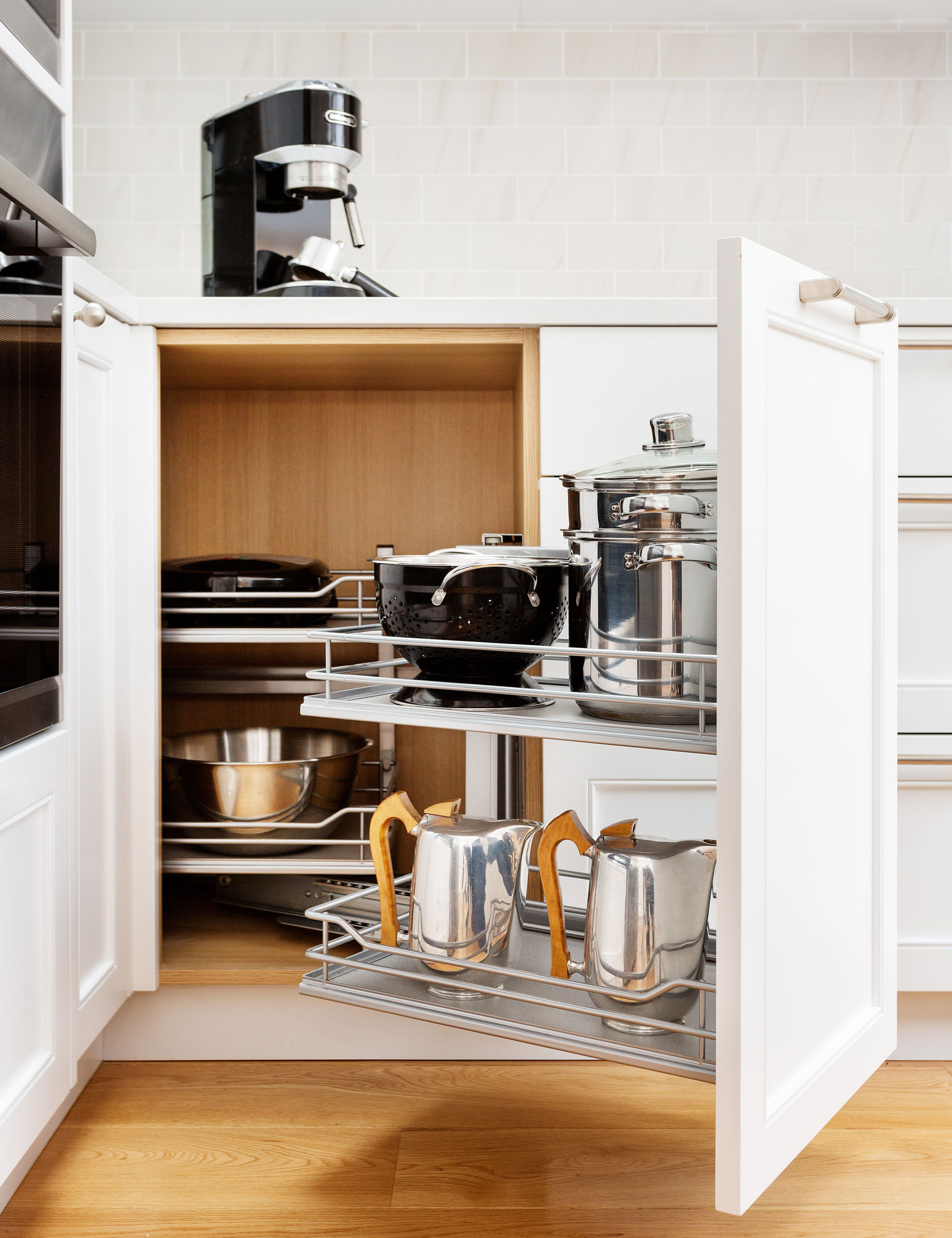
'Corner cupboards can be tricky, hard-to-reach spaces,' says Felix Milns, founder of HUX London, 'but a well-designed kitchen should offer clever solutions for all your storage needs, such as this pull-out carousel corner cupboard. A bespoke design created specifically for this kitchen, it features two layers of shelving to create maximum storage and the pull-out concept allows easy access to even those pots and pans stored away right at the back. The short rail around the bottom of each shelf ensures items don’t fall out when you open the cupboard.'
Sophie Devonald, the designer at Crown Imperial, agrees: 'Ideal to achieve a clutter-free, organized kitchen space, create a dedicated storage zone for your pots and pans with an interior, corner pull-out. Designed for maximizing every centimeter, the clever solution offers tiered storage with easy ergonomic access, all ready to cook up a storm.'
Umbra Peggy Drawer Organizer | $20 at Crate & Barrel
This in-drawer kitchen organizer keeps your most challenging items tidy.
8. Try a ceiling pot rack
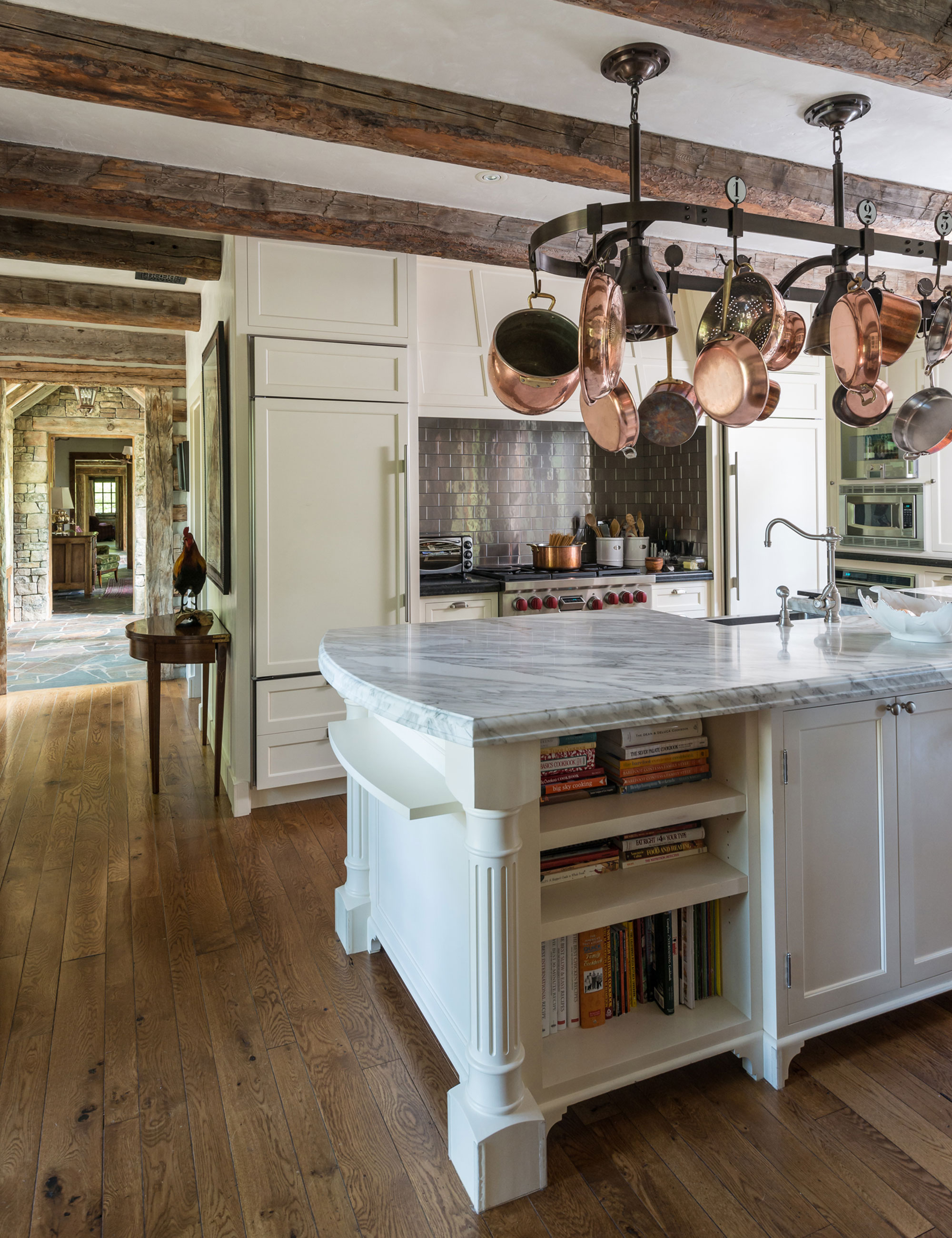
Hanging pots, pans, lids and utensils overhead on a stylish rail or rack might be steeped in tradition but it still holds masses of appeal in the 21st-century kitchen. It will add a professional, chef-at-home mood to your scheme, making cookware storage stand out and instantly accessible. A ceiling pot rack will also maximize space in a small kitchen where wall storage might be at a premium.
'If you have a lot of pots or pans, then think about a ceiling pot rack as this makes life so much easier than stacking them in cupboards,' adds Helen Parker creative director of deVOL. 'A simple pot rack above a stove – nothing too ornate just a simple, utilitarian design – allows you to easily store and reach your biggest and heaviest pans. They are such a great look, practical and hold way more than you could ever fit in a cupboard.'
9. Maximize wall space with a rail
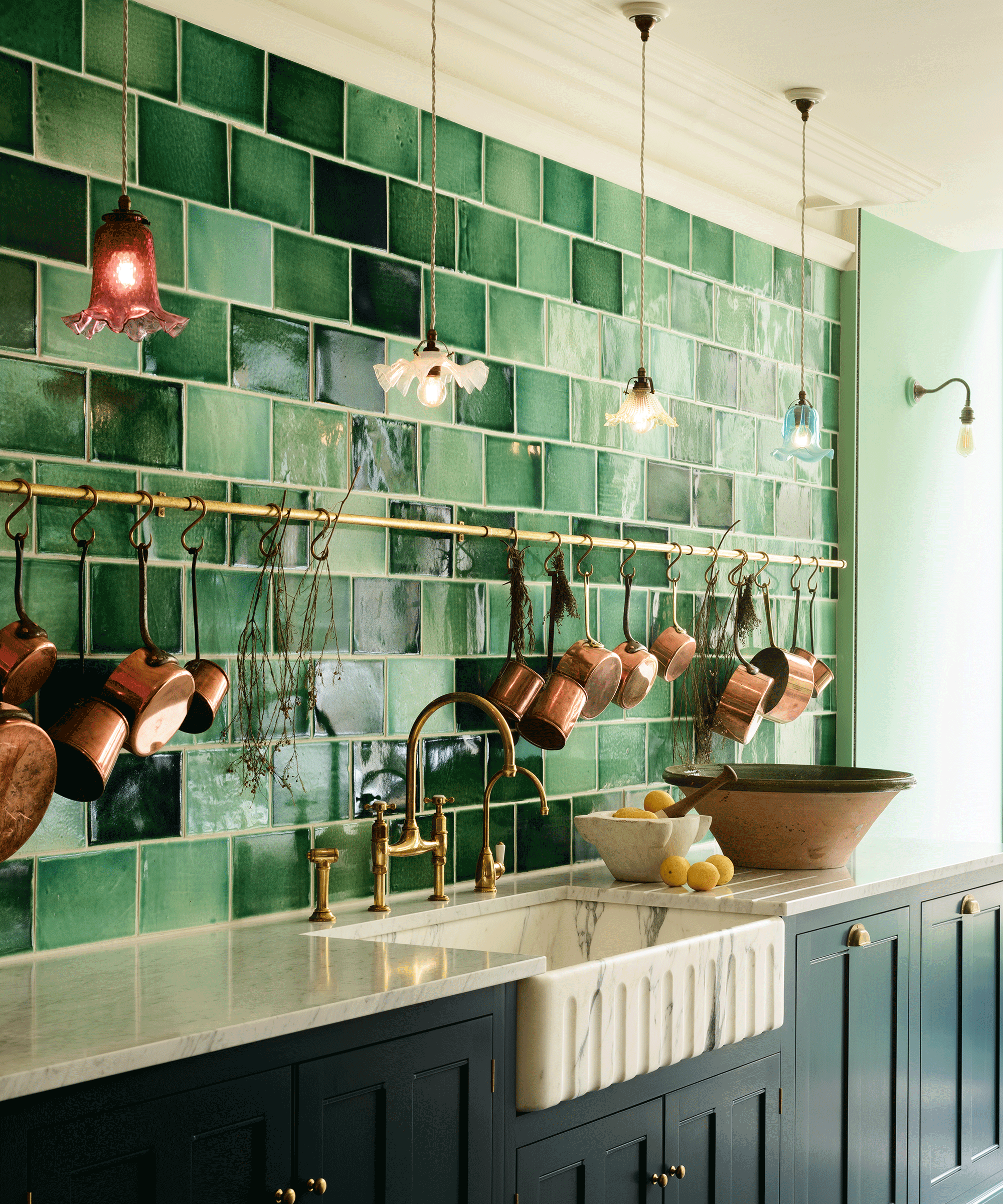
A simple horizontal wall rail is an effective way to hang pots and pans allowing you to instantly view the different sizes of cookware you own – and creating a design focal point for your cooking kit. Installing the rail behind the stovetop adds even more usability, keeping key items close to hand while cooking.
'For an eclectic look, keeping key items on display will add personality and keep them in an easy-to-grab position,' adds Hood at Roundhouse. 'For instance, the iconic, brightly colored Le Creuset pots will make art from everyday objects.' Parker at deVOL agrees: ‘Hanging rails are a big yes. I love nothing more than a brass rail and all the storage display options it gives me.'
Ferm Living Kitchen Rod | $105 at Ferm Living
With a kitchen wall organizer, everything you need is within reach whilst keeping your countertops free.
10. Conceal behind a screen
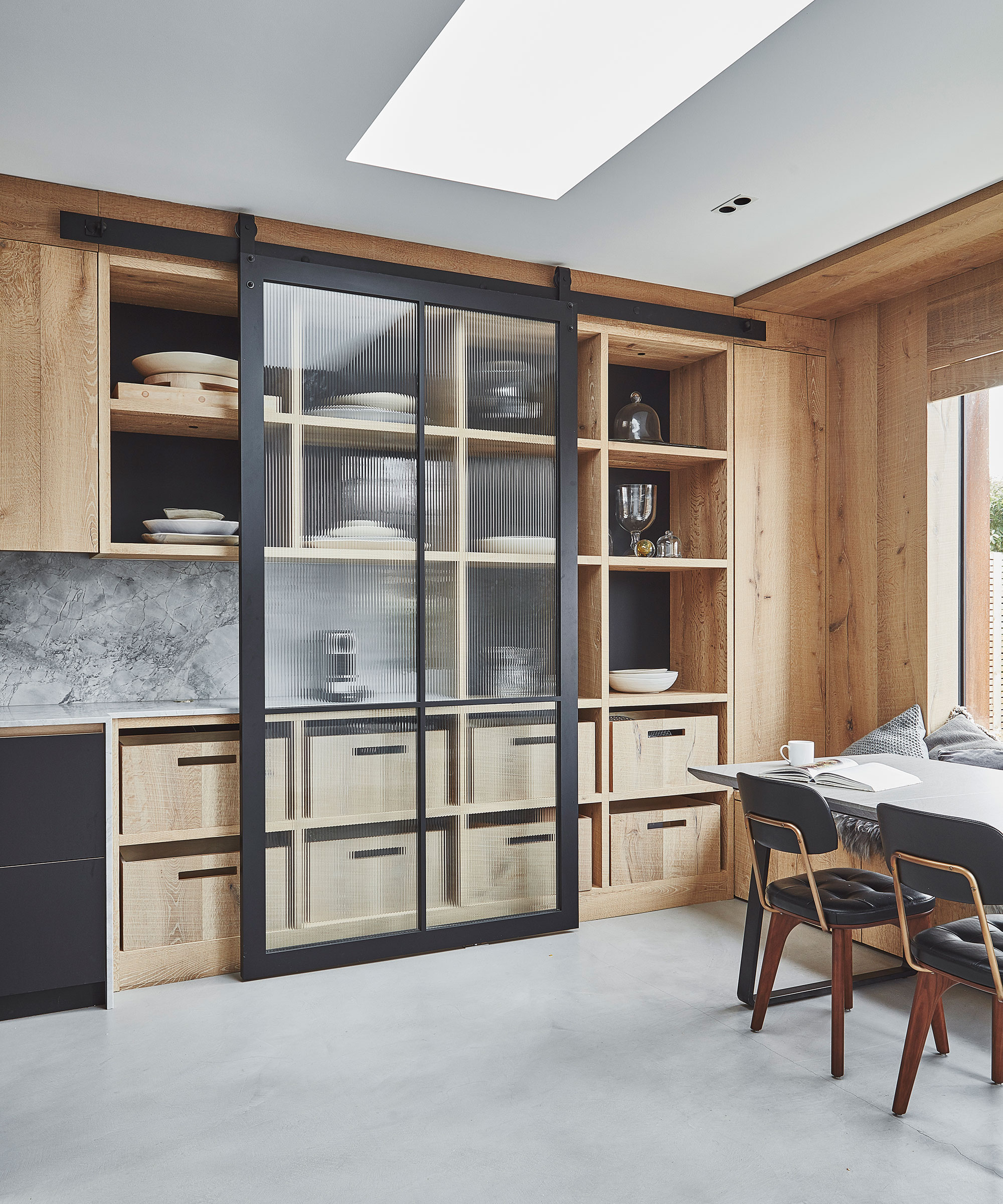
For a clutter-free, slick look, hiding pots and pans behind closed doors will always win out. Large, floor-to-ceiling cupboards, kitted out with smooth, glide-out drawers and internal organizers are a dream for stashing your cookware – especially if located within the working area of the kitchen. For the best of both worlds, hang a sliding glass panel so you can conceal and reveal a different part of your cookware and crockery as desired.
'On this wall run, we added a section of open shelving to break up the wall-hung cabinetry and add character and further points of interest to the room,' says Sophie Chapman, associate director of The Vawdrey House.
'These open shelves offer an opportunity to display beautiful ceramics and pans that have been bought not only for their utility but for their beauty. It seems a shame to have these valuable items hidden away until needed, so displaying them on a shelf in the kitchen means they can be enjoyed even when they aren’t in use. The sliding screen allows the homeowner to hide parts of the shelving away behind a fluted screen to hide away any mess.'
Tower Adjustable Lid & Pan Organizer | $47 at Burke Decor
Make cooking simple with a kitchen organizer for pots and pans.
FAQs
How many pots and pans do I need?
Working out how many pots and pans you need for cooking is often down to individual needs. Ask yourself a few questions: how often do you cook, how big is your kitchen and how experimental are you with your recipes. Believe it or not, every cookware collection needs just three basic pots to start with, to cover almost every cooking task: a two-quart saucepan, a 10-inch sauté or frying pan and an eight-quart stockpot. And remember, if you’re just buying three, you can afford to invest in good quality pots and pans made of the best metals for the job. You don’t need to buy sets either – you can mix and match individual pots and pans to suit your cooking habits.
When should I throw pots and pans away?
Your pots and pans might be looking a bit worse for wear but when should you definitely replace them with new ones? Some experts recommend replacing lightweight, non-stick cookware every five years particularly if the non-stick finish is scratched or pitted. Warped pan bottoms can cause uneven cooking while loose handles are a potential hazard with hot ingredients – both should be replaced as soon as possible. Look out for cracks or peeling which might indicate that metals are seeping into the food, presenting a health risk.
Don’t just throw your old pots and pans into the rubbish bin destined for landfill. Check with local, and municipal departments what pots and pans can be recycled, and contact scrap metal merchants who might take your old cookware. Terracycle runs free programs for typically hard-to-recycle waste to help reduce your impact on the planet.
Sign up to the Homes & Gardens newsletter
Design expertise in your inbox – from inspiring decorating ideas and beautiful celebrity homes to practical gardening advice and shopping round-ups.
Lara has worked in the ever-changing world of interiors and lifestyle journalism for many years. She cut her teeth in a busy newsroom of a kitchen and bathroom business title where she gained vast product knowledge and industry contacts that would prove invaluable. She now freelances for a variety of magazines, newspapers and online blogs and relishes the changing landscape of the interiors world.
-
 Kris Jenner's favorite air fryer, the Ninja Crispi, is the perfect small kitchen solution – it deserves a place on the most compact of countertops
Kris Jenner's favorite air fryer, the Ninja Crispi, is the perfect small kitchen solution – it deserves a place on the most compact of countertopsKris approves of this compact yet powerful air fryer, and so do our own kitchen appliance experts, praising it for its multifunctionality
By Hannah Ziegler Published
-
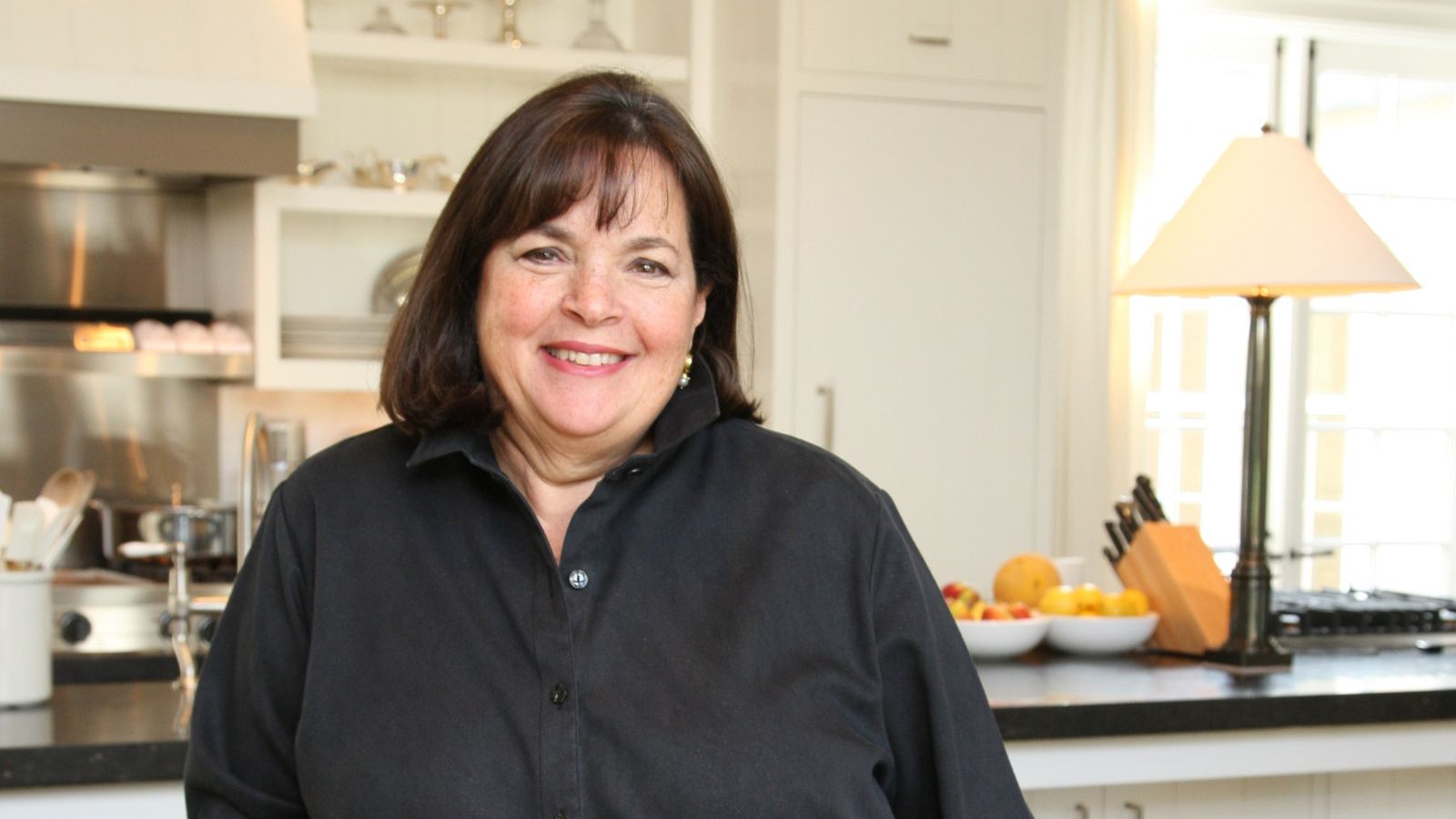 Ina Garten's storage pantry is an insightful window into all of the best cookware used by the chef – and it's easy to recreate on your kitchen shelves from $48
Ina Garten's storage pantry is an insightful window into all of the best cookware used by the chef – and it's easy to recreate on your kitchen shelves from $48The beautiful dishware in The Barefoot Contessa's Hamptons pantry showcases the tools she uses most often to cook – this is exactly how you replicate it
By Sophie Edwards Published
